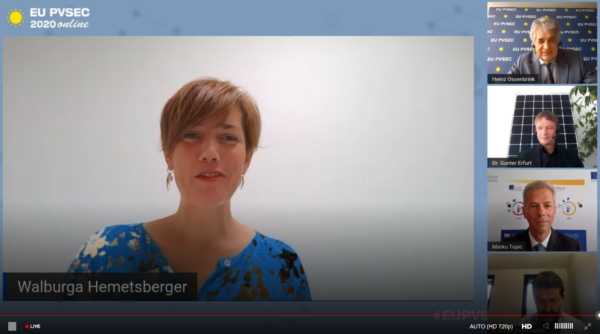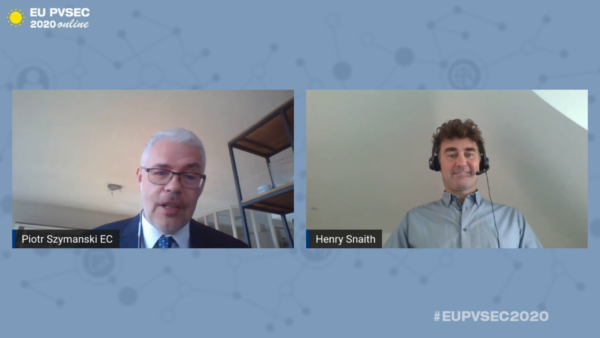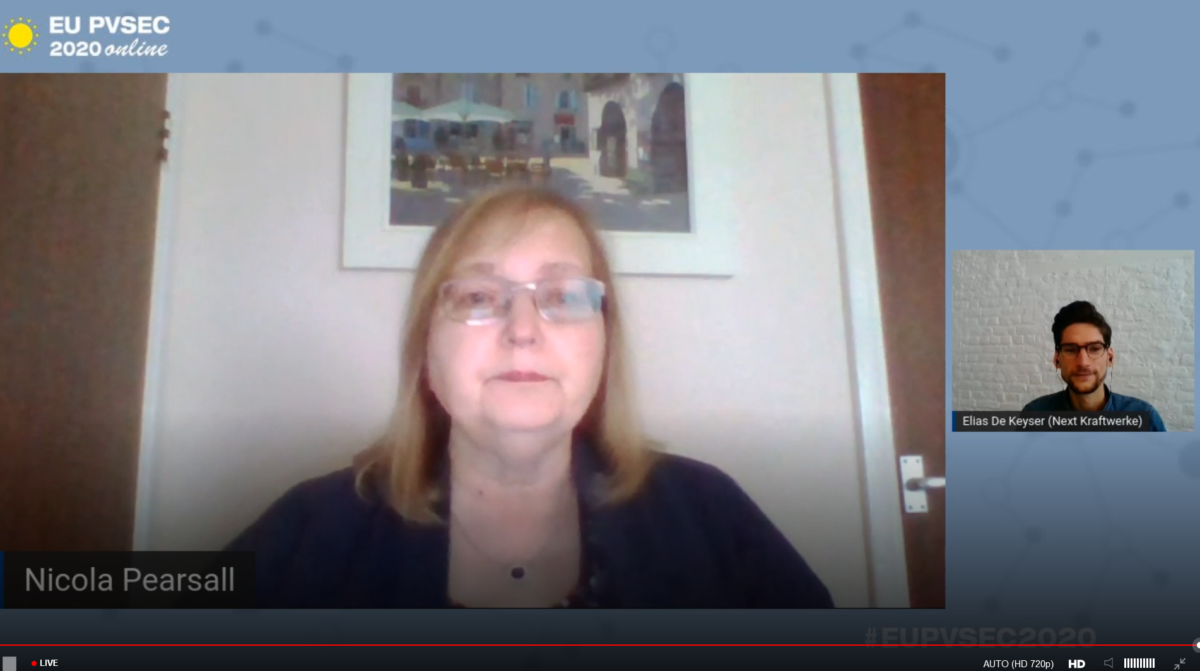The latest challenges for Europe’s PV industry were laid bare in this morning’s opening session of the week-long European PV Solar Exhibition and Conference (EU PVSEC), which will discuss the latest solar technology via a virtual platform.
This morning’s session heard optimism from the PV sector as leading players spoke of their expectations of a rapid growth in installation in the coming years, new technology breakthroughs and the return of large scale solar manufacturing to Europe.
Nicola Pearsall, professor of renewable energy at England’s Northumbria University and general chair of the conference, opened the event by focusing on the need for the research community to pull together to deal with the economic fallout from the Covid-19 pandemic, particularly by providing support to future generations. “Young people in many countries are committed to addressing climate change and I hope that we can provide many of them with options for careers in the renewable energy sector,” Pearsall told the virtual audience.
The academic’s speech was accompanied by a presentation from Elias De Keyser, from German virtual power plant operator Next Kraftwerke, which looked beyond innovations in PV technology to ask: “How can we ensure that all that renewable power is safely injected into the grid and reaches the consumer without endangering electricity systems which were in many cases designed with a totally different topology in mind?”
De Keyser noted many utilities still rely on gas-fired power to balance the intermittency of solar and wind. “The energy transition requires us to do better,” he said. The solution, he suggested, is virtual power plants which offer an increasingly affordable route to a reliable fully-renewable-energy system.
The session continued with a panel discussion which expressed optimism about the possibility of PV manufacturing returning to Europe. Walburga Hemetsberger, CEO of trade body SolarPower Europe, said EU member state governments must ensure some of the €750 billion Covid recovery fund established by the bloc must go towards developing a European solar manufacturing industry.
Popular content

Image: pv magazine/EU PVSEC
Private investors will also have a role to play, and a live poll during the session saw 82% of the audience state they would consider investing in a PV manufacturing company.
Becquerel prize
The opening day of the conference saw the award of the Becquerel Prize, given for contributions to the field of photovoltaic science. This year’s recipient was professor Henry Snaith, of Oxford University, who received the award for his pioneering work on perovskite solar cells.

Image: pv magazine/EU PVSEC
“I am honored to receive this prestigious award,” said Snaith. “I am excited about the future of perovskite PV and its role in the clean energy transition. Perovskite PV has demonstrated its immense opportunity to transform solar energy generation.”
The professor delivered a presentation about the commercialization of perovskite technology by the Oxford PV company spun out of his laboratory. The business has been working on the production of perovsite-silicon tandem cells at a site in Brandenburg, Germany, and expects to begin large scale production by the middle of next year.
This content is protected by copyright and may not be reused. If you want to cooperate with us and would like to reuse some of our content, please contact: editors@pv-magazine.com.



By submitting this form you agree to pv magazine using your data for the purposes of publishing your comment.
Your personal data will only be disclosed or otherwise transmitted to third parties for the purposes of spam filtering or if this is necessary for technical maintenance of the website. Any other transfer to third parties will not take place unless this is justified on the basis of applicable data protection regulations or if pv magazine is legally obliged to do so.
You may revoke this consent at any time with effect for the future, in which case your personal data will be deleted immediately. Otherwise, your data will be deleted if pv magazine has processed your request or the purpose of data storage is fulfilled.
Further information on data privacy can be found in our Data Protection Policy.